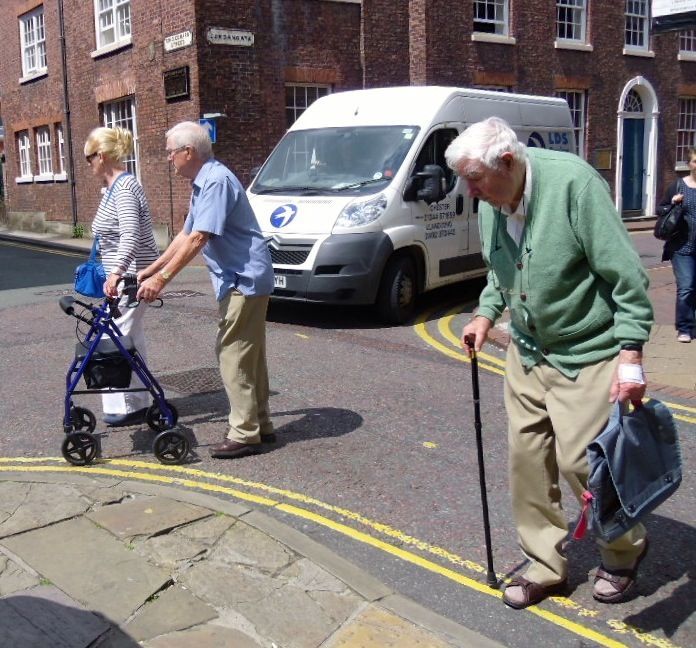Critical Insights into Assisted Living: Care, Cost, and Quality - Part 2 of 4
Critical Insights into Assisted Living: Care, Cost, and Quality - Part 2" delves into the realities of assisted living, highlighting the gaps in care for seniors with special needs and the hidden costs burdening families, urging the need for industry reform

The Illusion of Luxury in High-End Assisted Living Communities
Despite their elegant exteriors, grand dining rooms, and luxurious lobbies, high-end assisted living facilities often hide the reality of extra costs and variable care quality. These facilities charge for every small service, from room upkeep to health checks, leading to unexpected expenses beyond the standard living cost.
When I explain to my clients that Assisted Living is potentially one of the riskiest components of the healthcare system, they often perceive it as an exaggeration. After all, how could these elegant establishments, complete with dining rooms staffed with chefs and lobbies graced by Steinway pianos, be perilous in any way?
Challenges in Budget-Friendly Assisted Living Facilities
At the other end, assisted living facilities catering to those dependent on Social Security face different problems. These facilities, lacking the amenities of their more expensive counterparts, often compromise on essential aspects like food quality and proper heating, impacting the well-being of assisted living residents.
Residents in these facilities often lack access to the amenities enjoyed by their high-end counterparts, and, unfortunately, many feel voiceless
One consistent concern in all Assisted Living facilities is that they primarily adhere to a "social model" rather than a medical one. Yet, if you visit an Assisted Living Facility on any given day, you'll find residents:
- Using oxygen
- Relying on walkers
- Coping with various medical conditions such as diabetes and kidney disease
A recent study even revealed that as many as two-thirds of Assisted Living residents suffer from some form of dementia.
The Predominant Social Model and Its Limitations
A key issue across many assisted living communities is the reliance on a social model of care, focusing more on daily living and social activities rather than specialized medical care. This approach is especially problematic for residents with chronic medical conditions or those in need of skilled nursing care.
Recently, I observed a med tech distributing medications to a resident in one such facility. As I engaged in conversation with the resident, I noticed her chewing all the pills. I inquired why the med tech hadn't administered the pills with applesauce or yogurt to ease her swallowing. His response was that none of the 156 clients required assistance with swallowing and that he was confident all the medications could be chewed, despite lacking information on her specific medications.
These Assisted Living facilities operate as "social models," even accepting residents in wheelchairs with needs ranging from incontinence care to insulin injections and occasional wound care.
Safety Issues in Assisted Living Facilities
They rely on home care agencies to provide intermittent care. However, issues arise with insulin-dependent clients who may have difficulty administering injections due to poor eyesight. Unfortunately, insurance doesn't cover this ongoing service, yet low-end facilities accept these residents before determining how to provide the care. Profit often takes precedence over safety.
For seniors with multiple medical conditions, the "social model" of Assisted Living is no longer a safe or acceptable living arrangement. A recent incident involving one of my clients, an electric wheelchair user with limited mobility and few opportunities to leave the facility, illustrated the perils. While navigating a narrow walkway, her wheelchair tipped over. We had to summon an ambulance for assistance, which led to an ER visit for assessment.
During this ordeal, I noticed that her pants were wet, and she hadn't received a change before leaving the facility. When I mentioned this to the ambulance crew and hospital staff, their responses cast a negative light on the assisted living facility's reputation.
When I discussed my concerns with the facility's administrator, his response was disheartening. It ultimately came down to finances; she was a high-paying client who had transitioned to Social Security, necessitating cuts in her care. According to him, his staff was doing an excellent job.
In another incident, I witnessed staff transferring the same client from her wheelchair to the bed improperly, causing her unnecessary pain. Despite offering a more suitable approach, the aides resisted, citing their experience and dismissing my suggestions.
One day, while browsing an aide forum, I stumbled upon a concerning account from an aide working in an Assisted Living facility. She had observed a med tech discarding medications meant for residents into the trash, only to be ignored when reporting it to the administration.
These are just a few examples of the safety issues that can plague Assisted Living facilities and board-and-care homes.
Medication Management: A Critical Issue in Assisted Living Resident Care
In numerous assisted living communities, the task of medication management is frequently delegated to aides who may have received minimal training. This practice raises significant concerns regarding the safety and effectiveness of medication administration, a vital aspect of resident care in these settings. Medication management in assisted living encompasses a range of responsibilities, from ensuring accurate dosing to monitoring potential side effects and interactions between different prescriptions.
The potential risks associated with this approach are manifold. First, aides with limited training may lack the necessary knowledge to understand the complexities of various medications, including their dosing requirements, potential side effects, and interactions with other drugs. This gap in expertise can lead to errors in medication administration, such as incorrect dosing, missing doses, or administering the wrong medication, which can have serious, even life-threatening consequences for residents.
Another concern is the lack of proper oversight and quality control in medication management in these facilities. Without the presence of skilled nursing professionals or registered nurses, there is often inadequate supervision to ensure that medication is being administered correctly and safely. This lack of oversight increases the risk of medication errors and diminishes the quality of care provided to residents.
Moreover, in many assisted living facilities, the medication management process lacks individualization. Each resident's medication needs can vary significantly, requiring a personalized approach to their care. However, aides with minimal training may not be equipped to tailor medication management to each resident's unique health profile, leading to a one-size-fits-all approach that may not be effective or safe.
Additionally, the communication between healthcare providers and assisted living staff is crucial in medication management. Inadequate communication can result in delays in updating medication orders or failure to convey important information about a resident's changing health status, further complicating the safe administration of medications.
In summary, the practice of entrusting medication management to minimally trained aides in assisted living settings poses a significant risk to the health and safety of residents. This issue highlights the need for enhanced training, better oversight, more individualized care approaches, and improved communication between healthcare providers and assisted living staff. Addressing these concerns is essential to ensure that residents receive the safe, effective medication management they require for their well-being.
Inadequate Care for Residents with Intensive Needs in Assisted Living Facilities
Assisted living communities, designed to bridge the gap between independent living and nursing home care, increasingly accommodate residents with complex medical conditions. However, these facilities often struggle to provide consistent and adequate care for such residents, especially those requiring specialized treatments like insulin injections or advanced wound care. This challenge is accentuated in assisted living settings that depend on external home care agencies for intermittent care, leading to a noticeable gap in the quality and continuity of services offered.
Challenges in Managing Complex Medical Needs
Residents with conditions that necessitate skilled nursing care, such as diabetes management or wound treatment, require more than the standard personal care services typically offered in assisted living communities. The staff in many of these facilities, primarily trained in assisting with daily living activities and basic medication management, may lack the expertise needed for more specialized medical tasks. This limitation can lead to inadequate monitoring of blood sugars for diabetic residents or insufficient wound care, exacerbating health risks.
Dependency on External Home Care Agencies
To address these specialized needs, some assisted living facilities rely on external home care agencies to provide intermittent skilled nursing services. However, this arrangement often leads to inconsistencies in care. External caregivers may not be fully integrated into the resident's overall care plan, leading to fragmented care and communication gaps between the regular staff of the assisted living facility and the visiting healthcare professionals. This lack of coordination can result in overlooked health issues and delays in necessary medical interventions.
Impact on Resident Health and Well-being
The consequence of this inadequate care is significant for residents with intensive medical needs. Without consistent and skilled medical care, these residents may experience a decline in their health, leading to complications, hospitalizations, or a general deterioration in their quality of life. Furthermore, the emotional and psychological impact of feeling inadequately cared for can affect the overall well-being and morale of these residents.
Need for Enhanced Training and Staffing
To mitigate these challenges, there is a pressing need for enhanced training for assisted living staff in handling more complex medical conditions. This training should extend beyond basic care to include specialized skills in managing conditions like diabetes and providing wound care. Additionally, increasing the staffing levels of qualified healthcare professionals, such as registered nurses or certified nursing assistants, within these communities would significantly improve the quality of care for residents with intensive medical needs.
Collaboration and Integrated Care Approaches
An integrated approach to care, involving collaboration between assisted living staff and external healthcare providers, is crucial. This collaboration would ensure that all aspects of a resident's health are monitored and managed effectively, with clear communication channels established between different caregivers. Regular meetings, shared care plans, and coordinated interventions could greatly enhance the continuity and quality of care provided.
While assisted living facilities play a vital role in the spectrum of senior housing options, addressing the care needs of residents with more complex medical conditions remains a significant challenge. Improving training, staffing, and coordination with external healthcare providers are essential steps towards ensuring that these residents receive the comprehensive and consistent care they need and deserve.
Case Studies: Exposing the Harsh Truths of Assisted Living Care
The realities of assisted living can be starkly different from its promised ideals, especially for residents with specific care needs. Real-life incidents and case studies from various assisted living communities offer a window into the actual experiences of seniors, particularly those with limited mobility or complex medical conditions. These cases highlight the urgent need for reform in the current assisted living model, revealing a significant gap between the level of care needed and the care actually provided.
The Plight of Seniors with Limited Mobility
One poignant example involves a senior resident with limited mobility. Despite residing in a facility that purported to offer comprehensive personal care and supportive living, this resident faced ongoing neglect and inadequate care. Issues ranged from insufficient assistance with daily living tasks to a lack of timely response to mobility-related needs. Such neglect not only compromises the physical health of residents but also affects their mental and emotional well-being.
Inadequate Response to Medical Emergencies
Another case study involves a resident coping with diabetes, a condition requiring consistent medical care and skilled nursing attention. The assisted living facility, operating primarily under a social model, was ill-equipped to manage her fluctuating blood sugar levels. The lack of immediate medical intervention in instances of high or low blood sugar episodes resulted in avoidable health crises, further demonstrating the facility's inability to address the medical needs of its residents adequately.
The Disconnect in Memory Care Units
Memory care units within assisted living communities are often considered specialized environments designed for residents with cognitive health issues, such as dementia. However, several case studies have shown that the care in these units can be woefully insufficient. Instances of residents wandering unsupervised or not receiving appropriate mental stimulation and emotional support are not uncommon, pointing to a serious lapse in the quality of memory care.
Issues with Medication Management
Medication management is another area where assisted living facilities frequently fall short. In one instance, a resident was consistently given incorrect dosages of medication, leading to adverse health effects. The staff, primarily consisting of aides with minimal training in medication management, failed to adhere to the prescribed medication regimen, thereby jeopardizing the resident's health.
The Need for Comprehensive Reform
These real-life cases underscore the pressing need for comprehensive reform in the assisted living sector. This reform should encompass several key areas: enhancing staff training, particularly for those dealing with residents requiring skilled nursing care; improving oversight and accountability mechanisms; and ensuring that facilities are adequately staffed to meet the diverse needs of their residents, from those living independently to those requiring more intensive medical and personal care.
In conclusion, these case studies serve as a critical reminder of the disparities in care within the assisted living industry. They call attention to the need for a more robust and responsive care model that can adequately cater to the varied and often complex needs of assisted living residents. Addressing these challenges is imperative to ensure that assisted living truly lives up to its promise of providing a safe, nurturing, and supportive environment for all seniors.
I will delve deeper into the perspective of organizations like Emeritus and the Assisted Living Federation of America (ALFA), shedding light on their promotion of Assisted Living.
First, let me share Emeritus response to the Frontline story here
- ASSISTED LIVING
- ASSISTED LIVING FACILITIES
- DEMENTIA CARE
- EMERITUS SENIOR LIVING
- MEMORY CARE
Our Resources section can help you find the information and tools that you need. We have courses, videos, checklists, guidebooks, cheat sheets, how-to guides and more.
You can get started by clicking on the link below. We know that taking care of a loved one is hard work, but with our help you can get the support that you need.
Click here to go to Resources Section now!
Previous article
Assisted Living Realities: Navigating the Social Model's Challenges in Senior Care Part 1 of 4
Next article
Emeritus Senior Living: Response to Frontline Story- Part 3
RELATED ARTICLES MORE FROM AUTHOR
Elder Independence: Caregiver Tip to Avoid Dependence
You might also like this article:








